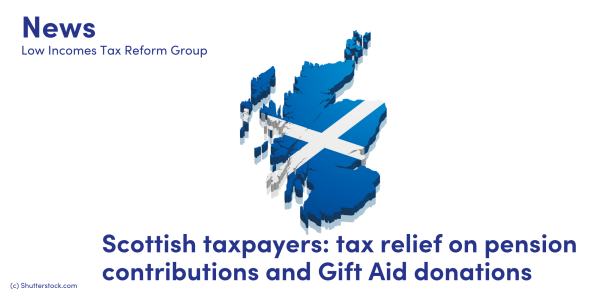Scottish taxpayers: tax relief on pension contributions and Gift Aid donations
Since April 2018, there have been five rates and bands of Scottish income tax. This affects the way in which some Scottish taxpayers get tax relief on pension contributions and Gift Aid donations. Our article below explains how you can make sure you get the right tax relief.

What are the rates and bands for Scottish income tax for 2021/22?
The rates and bands for Scottish income tax from 6 April 2021 are set out below:
|
Scottish income tax rates 2021/22 |
Scottish income tax bands 2021/22 * |
|
Scottish starter rate – 19% |
£12,571 – £14,667 (band of £2,097) |
|
Scottish basic rate – 20% |
£14,668 – £25,296 (band of £10,629) |
|
Scottish intermediate rate – 21% |
£25,297 – £43,662 (band of £18,366) |
|
Scottish higher rate – 41% |
£43,663 – £150,000 |
|
Scottish top rate – 46% |
£150,001 and above |
* The bands assume the UK-wide personal allowance for 2021/22 of £12,570 is available. The personal allowance reduces by £1 for every £2 of adjusted net income above £100,000.
What income do I pay Scottish income tax on?
If you are a Scottish taxpayer, you pay Scottish income tax on your non-savings and non-dividend income.
Non-savings and non-dividend income includes profits from rental property, and earned income, such as employment income, pension income and profits from self-employment.
If you are a Scottish taxpayer, you continue to pay income tax according to the UK rates and bands of income tax on your savings and dividend income.
Am I a Scottish taxpayer?
There is more information about who is a Scottish taxpayer in our tax basics section. Broadly however, if your home is in Scotland for more than half of a tax year, you are a Scottish taxpayer.
How do I get tax relief on my pension contributions?
If you are a Scottish taxpayer, you are entitled to receive tax relief on your pension contributions according to the rates and bands of Scottish income tax. The way in which you receive your tax relief depends on the type of pension scheme you are in.
If you pay pension contributions into your employer’s pension scheme under a net pay arrangement, you automatically receive tax relief at the correct tax rate. So, if the highest rate of Scottish income tax that you pay on your employment income is 21%, you receive income tax relief at 21%. This means you do not need to take any further action.
If you make pension contributions into a relief at source arrangement, your pension provider will claim tax relief from HM Revenue & Customs (HMRC) at the rate of 20% – the basic rate of income tax. They add this into your pension pot, increasing your contribution.
If you are a non-taxpayer or pay Scottish income tax at the 19% or 20% rates only, you automatically receive tax relief at 20% on your pension contributions into a relief at source arrangement. You do not need to take any further action.
If you pay tax at the intermediate rate of 21%, you can claim extra tax relief of 1% from HMRC – the difference between your highest rate of tax and the automatic relief of 20%.
If you normally complete a Self Assessment tax return, you can claim the extra tax relief by completing the appropriate section on your tax return.
If you do not complete a Self Assessment tax return, you have to contact HMRC to tell them about your pension contributions. They will then make an adjustment to you tax code, to provide you with the tax relief.
There is detailed guidance on how tax relief on pension contributions works in the tax basics section of this website.
How do I get tax relief on my Gift Aid donations?
With any Gift Aid donation, if you do not actually pay enough tax to cover the tax relief that the charity claims, HMRC may ask you to pay the difference.
Charities claim tax relief at 20% from HMRC on any donations you make under Gift Aid, regardless of which rate of Scottish income tax you pay.
If your highest rate of Scottish income tax is 19% or 20%, you do not need to take any further action – if you make a donation under Gift Aid, the charity will be able to claim tax relief at 20%, increasing the benefit they receive from your donation.
If you pay income tax at a rate higher than the basic rate, you can claim back from HMRC the difference between the rate you paid and the Scottish basic rate.
So, if you pay Scottish intermediate rate tax (21%), you can get an additional 1% tax relief.
To claim the extra tax relief, you need to tell HMRC about the Gift Aid donation. If you normally complete a Self Assessment tax return, you can do this by completing the appropriate section on your tax return.
If you do not complete a Self Assessment tax return, you may have to claim a refund directly from HMRC.
Who collects Scottish income tax?
Although the Scottish Parliament sets the rates and thresholds for income tax payable by Scottish taxpayers on certain types of income, HMRC continue to collect and administer all income tax. This means that if you have any questions about your income tax, including your Scottish income tax, you should contact HMRC.
Why is it important to tell HMRC my correct address?
It is important to make sure that HMRC have your correct and up-to-date address. This is not the only factor in determining Scottish taxpayer status, but it will be decisive in many cases. You can tell HMRC your up-to-date address using their online service.
Where can I find more information about Scottish income tax?
You can find more information about Scottish income tax in the tax basics section.
